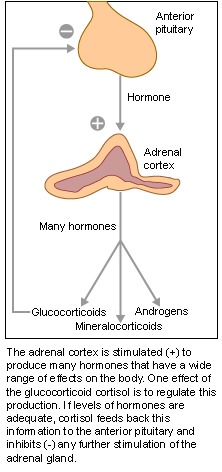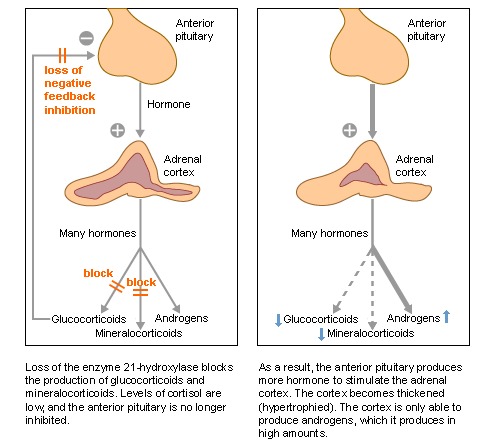
Click here for further information
Congenital adrenal hyperplasia (CAH) is a genetic disease that affects the adrenal glands. The production of several important hormones is blocked.
One adrenal gland sits on top of each kidney. The outer cortex of the gland secretes three types of hormones that may be missing in CAH:
- Corticosteroids, such as cortisol, are important in the body’s response to illness or injury.
- Mineralocorticoids, such as aldosterone, regulate the levels of salt and water in the body.
- Androgens, such as testosterone, are the sex hormones.
The most common cause of CAH is a deficiency of the enzyme 21-hydroxylase. The gene for this enzyme lies on chromosome 6. There are two copies of the gene because of a duplication that occurred hundreds of thousands of years ago. One gene is called CYP21 and is the active gene; the other is called CYP21P and is inactive. The 21-hydroxylase deficiency is unique because most mutations result from the transfer of genetic information between inactive and active genes.
Various mutations of the 21-hydroxylase gene result in various levels of enzyme. As a consequence, there is a spectrum of effects.
In the absence of 21-hydroxylase, affected individuals are unable to make cortisol and aldosterone. The adrenal gland responds by trying to increase production of all its hormones. The number of cells increases, a phenomenon called adrenal hyperplasia. Other hormones such as androgens are pathologically overproduced.
But because of the missing enzyme, cortisol and aldosterone levels still do not rise. Cortisol deficiency causes low levels of sugar in the blood. Aldosterone deficiency can cause a "salt wasting crisis" where the body loses too much salt and, eventually, water.
The effects of CAH can begin in the womb. An affected fetus can produce high levels of androgens. This may result in girls being born with masculine-appearing external genitals. In boys, it may result in early sexual development.
CAH cannot be cured, but it can be treated by replacing the missing hormones. In particular, it is essential to give more cortisol in times of stress. A mouse deficient in 21-hydroxylase is proving to be a useful model in which to test new types of treatment.
Related diseases
Publication Details
Copyright
Publisher
National Center for Biotechnology Information (US), Bethesda (MD)
NLM Citation
National Center for Biotechnology Information (US). Genes and Disease [Internet]. Bethesda (MD): National Center for Biotechnology Information (US); 1998-. Adrenal hyperplasia, congenital.
